一般现在时句型转换专项练习
最新一般现在时句型转换专项练习
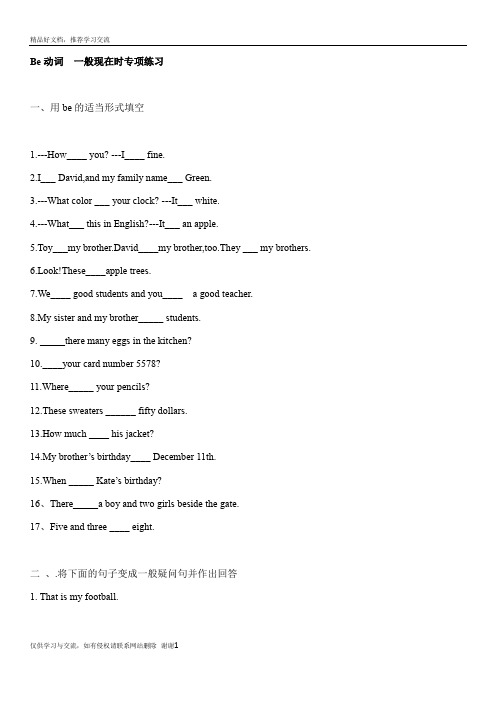
Be动词一般现在时专项练习一、用be的适当形式填空1.---How____ you? ---I____ fine.2.I___ David,and my family name___ Green.3.---What color ___ your clock? ---It___ white.4.---What___ this in English?---It___ an apple.5.Toy___my brother.David____my brother,too.They ___ my brothers.6.Look!These____apple trees.7.We____ good students and you____ a good teacher.8.My sister and my brother_____ students.9. _____there many eggs in the kitchen?10.____your card number 5578?11.Where_____ your pencils?12.These sweaters ______ fifty dollars.13.How much ____ his jacket?14.My brother’s birthday____ December 11th.15.When _____ Kate’s birthday?16、There_____a boy and two girls beside the gate.17、Five and three ____ eight.二、.将下面的句子变成一般疑问句并作出回答1. That is my football.2. Those are his books.3. Jim and Tom are good friends.4. My birthday is November 1st.5. His son is twelve years old.三、将下面的句子变成否定句1. His card is on the table.2. These are my parents.3. Bob and Tony are our friends.4. These things are five dollars.5. The girl is his sister.四、划线提问1. Our teachers are in the classroom.2. The girl’s telephone number is 032-55746.3. Her pen is black.4. They are thirteen years old.5. The boy is fine.6. The old man is my grandfather.7. These eggs are five yuan.一般现在时(动词为行为动词)的专项练习一、选择( ) 1. I _________a nice pen.A. haveB. hasC. doesn’t has ( ) 2. She ________ some picture books.A. haveB. hasC. are( ) 3. Li Ming’s mother _________ any eggs.A. haveB. don’t haveC. doesn’t have ( ) 4. ________his father _______ milk for breakfast?A. Does…haveB. Do…hasC. Does…has ( ) 5. _________they_______ train tickets?A. Does…haveB. Do…haveC. Does…has( ) 6. Mary _______a big bedroom.A. haveB. don’t haveC. doesn’t have( ) 7. ________Jenny and Danny have two suitcases? Yes, they ________.A. Does…doB. Do…doC. Do…does( ) 8. ________ her father________ two sisters? No.A. Do…hasB. Does…hasC. Does…have( ) 9. The dog _______ some meat.A. hasB. don’t haveC. doesn’t has( ) 10. The students of Class One ________a football.A. haveB. don’t hasC. doesn’t have( ) 11. I ________to read English books.A. likesB. don’t likesC. like( ) 12. They _______ to school on foot.A. goB. goesC. gos( ) 13. He _______to play with his balls.A. likesB. doesn’t likesC. like( ) 14. His father _________to work by bus.A. don’t goB. doesn’t goesC. doesn’t go( ) 15. Mrs. Li and Kitty _______in a big shop.A. don’t worksB. don’t workC. doesn’t work ( ) 16. —_____ you ride a bike to school?—Yes, I ________.A. Do…doesB. Does…doesC. Do…do ( ) 17. --______ your sister like PE?--No, she ______ not.A. Do…doB. Does…doesC. Do…does( ) 18. ________he _______to school every day? No.A. Does…goB. Do…goC. Does…goes( ) 19. We _________our homework after school.A. doesB. doC. dos( ) 20. He ______ not speak English. He speaks Chinese.A. doB. doesC. dos( ) 21. ______ they watch TV on Sundays? Yes, they ______.A. Do…doB. Does…doesC. Do…does二、把下列肯定句变为一般疑问句并作出肯定回答。
一般现在时句型转化练习题

一般现在时句型转化练习题一般现在时是英语中最基本的时态之一,用于描述现在经常发生的动作、存在的状态或者客观真理。
在句子构成方面,一般现在时通常由主语 + 动词原形构成,也可以用于其他句型,如否定句、疑问句、陈述句和祈使句等。
下面是一些关于一般现在时句型转化的练习题以及参考答案:1. 肯定句转否定句:原句:She often goes to the gym.转化:She doesn't often go to the gym.原句:They play soccer every Saturday.转化:They don't play soccer every Saturday.原句:I eat breakfast at 7 AM.转化:I don't eat breakfast at 7 AM.2. 否定句转肯定句:原句:He doesn't like coffee.转化:He likes coffee.原句:They don't live in London.转化:They live in London.原句:She doesn't speak French.转化:She speaks French.3. 一般疑问句转陈述句:原句:Do they study English every day? 转化:They study English every day.原句:Does he play the guitar?转化:He plays the guitar.原句:Does she work on weekends?转化:She works on weekends.4. 陈述句转一般疑问句:原句:They live in New York.转化:Do they live in New York?原句:He speaks Spanish.转化:Does he speak Spanish?原句:She likes to read.转化:Does she like to read?5. 一般现在时转进行时:原句:She plays soccer every Sunday.转化:She is playing soccer this Sunday.原句:I drink coffee in the morning.转化:I am drinking coffee this morning.原句:They watch TV in the evenings.转化:They are watching TV this evening.6. 陈述句转祈使句:原句:They listen to the teacher in class.转化:Listen to the teacher in class.原句:She goes home after work.转化:Go home after work.原句:He studies for exams every night.转化:Study for exams every night.以上是一些关于一般现在时句型转化的练习题和参考答案。
一般现在时句型转换
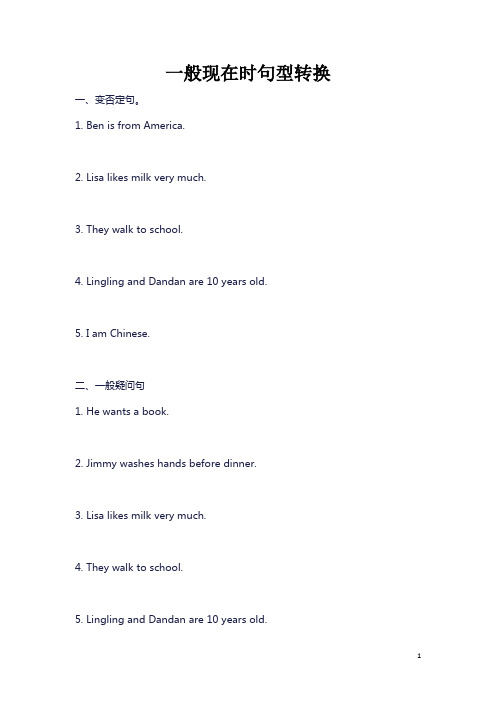
一般现在时句型转换一、变否定句。
1. Ben is from America.2. Lisa likes milk very much.3. They walk to school.4. Lingling and Dandan are 10 years old.5. I am Chinese.二、一般疑问句1. He wants a book.2. Jimmy washes hands before dinner.3. Lisa likes milk very much.4. They walk to school.5. Lingling and Dandan are 10 years old.6. I am Chinese.7. Ben is from America.三、就划线部分提问。
1. He wants a book.2. Jimmy usually washes hands before dinner.3. They walk to school on Monday.4. Lingling and Dandan are 10 years old.5. Ben is from America.6. We go to school every morning.7. They often play football after school.8 John comes from Canada.9. I take photos in the park.10.They swim sometimes.11.His birthday is on the twentieth of November.12.He likes English.13.His father goes to work by bus.14.He often cries under the tree.15.Mrs.Li and Kitty are in a big shop.16.Kitty wears her new skirt in summer.17.He goes to school every day.18.I want to have a model car..19.She wants a cup of coffee(咖啡).20.Mrs.Li and Kitty watch TV at night. 21·.I do my homework after school.22.Everybody is in the classroom.23.The boy does some housework at home.24.The children have a good time in the park.25. We have four lessons.26. Mike has two letters for him.。
一般现在时专项练习题

一般现在时专项练习题1.概念:一般现在时表示经常的、习惯性的动作或存在的状态。
可概括为①经常性或习惯性动作;②长期存在的特征或状态;③普遍真理、客观事实等。
2.构成:一般现在时的构成主要有两种形式,一般现在时用行为动词的原形,但第三人称单数作主语时,动词的词尾要加-S。
:3,一般现在时的用法1)经常性或习惯性的动作,常与表示频度的时间状语连用。
时间状语:usually,often,always, every…, sometimes,等I leave home for school at 7 every morning。
2)客观真理,客观存在,科学事实。
The earth moves around the sun。
Shanghai lies in the east of China。
3)表示格言或警句中。
Pride goes before a fall. 骄者必败。
用法:(1)be型:句子的谓语动词只有be(am,is或are):a.肯定句中I am a student.我是一名学生。
b.否定句中She isn't a teacher.她不是教师.c.一般疑问句,要将be放在句子开头—Are you ready?—你准备好了吗?—Yes,I am.-是的,我准备好了。
(—No,I'm not.—不,我没准备好。
)(2)实义动词型:句中的谓语动词为实义动词(也叫行为动词):a.肯定句中I get up in the morning.我早晨起床。
b.否定句中,I don’t like vegetables.我不喜欢蔬菜。
c.一般疑问句,要在句子开头加助动词Do—Do you like oranges?—你喜欢桔子吗?-Yes,I do.—是的,我喜欢。
(-No,I don’t.-不,我不喜欢。
)2。
主语是第三人称单数时谓语动词的变化。
(特别提一点:不可数名词也算作单数处理)3。
谓语动词的变化规律是:(1)在动词后加-sread — reads,write - writes,say - says(2)以s,x,ch,sh,o 结尾的词加—esteach — teaches,wash - washes,guess – guesses,go— goes,do— does(3)以辅音字母+y结尾的词变y为i再加-estry - tries,carry - carries(4)特殊变化的词be —is have— has主语是第三人称单数句子的变化形式:Tom likes reading books。
一般现在时句型转换专练 - 名词变更练习
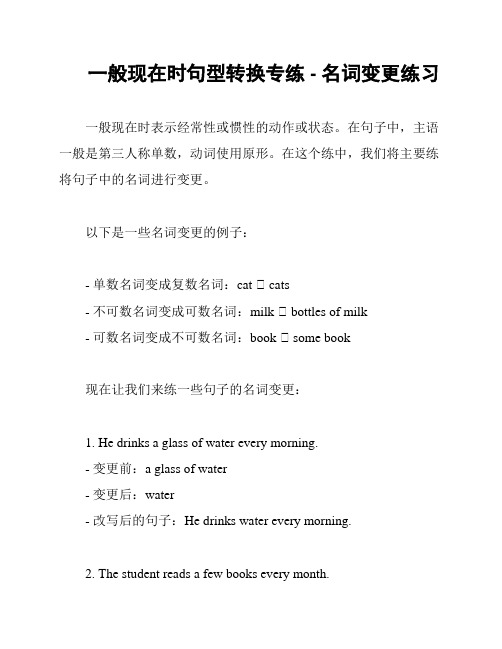
一般现在时句型转换专练 - 名词变更练习一般现在时表示经常性或惯性的动作或状态。
在句子中,主语一般是第三人称单数,动词使用原形。
在这个练中,我们将主要练将句子中的名词进行变更。
以下是一些名词变更的例子:- 单数名词变成复数名词:cat ➡️ cats- 不可数名词变成可数名词:milk ➡️ bottles of milk- 可数名词变成不可数名词:book ➡️ some book现在让我们来练一些句子的名词变更:1. He drinks a glass of water every morning.- 变更前:a glass of water- 变更后:water- 改写后的句子:He drinks water every morning.2. The student reads a few books every month.- 变更前:books- 变更后:book- 改写后的句子:The student reads a book every month.3. My family has two cars.- 变更前:cars- 变更后:car- 改写后的句子:My family has two cars.4. She always eats fruits for breakfast.- 变更前:fruits- 变更后:fruit- 改写后的句子:She always eats fruit for breakfast.- 变更前:software- 变更后:some software练习这些句子不仅能帮助你练习一般现在时的用法,也能够帮助你更好地理解名词的用法及其变化。
祝你练习愉快!。
一般现在时专项练习题
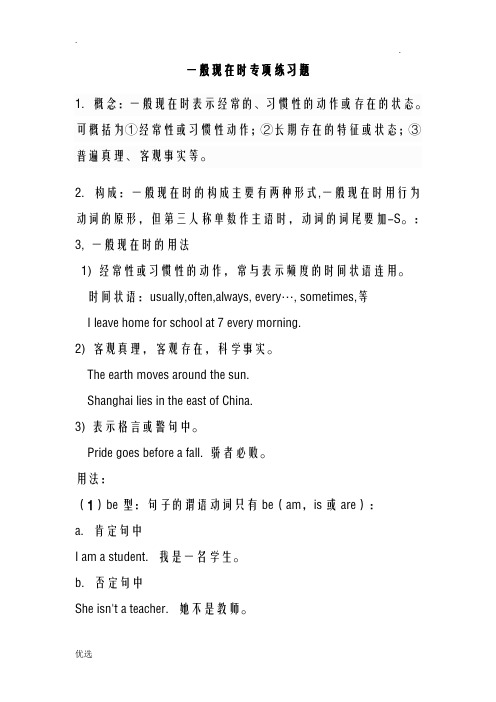
一般现在时专项练习题1.概念:一般现在时表示经常的、习惯性的动作或存在的状态。
可概括为①经常性或习惯性动作;②长期存在的特征或状态;③普遍真理、客观事实等。
2.构成:一般现在时的构成主要有两种形式,一般现在时用行为动词的原形,但第三人称单数作主语时,动词的词尾要加-S。
:3, 一般现在时的用法1) 经常性或习惯性的动作,常与表示频度的时间状语连用。
时间状语:usually,often,always, every…, sometimes,等I leave home for school at 7 every morning.2) 客观真理,客观存在,科学事实。
The earth moves around the sun.Shanghai lies in the east of China.3) 表示格言或警句中。
Pride goes before a fall. 骄者必败。
用法:(1)be型:句子的谓语动词只有be(am,is或are):a.肯定句中I am a student.我是一名学生。
b.否定句中She isn't a teacher.她不是教师。
c.一般疑问句,要将be放在句子开头—Are you ready?—你准备好了吗?—Yes,I am.—是的,我准备好了。
(—No,I'm not.—不,我没准备好。
)(2)实义动词型:句中的谓语动词为实义动词(也叫行为动词):a.肯定句中I get up in the morning.我早晨起床。
b.否定句中,I don't like vegetables.我不喜欢蔬菜。
c.一般疑问句,要在句子开头加助动词Do—Do you like oranges?—你喜欢桔子吗?—Yes,I do.—是的,我喜欢。
(—No,I don't.—不,我不喜欢。
)2.主语是第三人称单数时谓语动词的变化。
(特别提一点:不可数名词也算作单数处理)3.谓语动词的变化规律是:(1) 在动词后加-sread - reads,write - writes,say - says(2) 以s,x,ch,sh,o 结尾的词加-esteach - teaches,wash - washes,guess – guesses,go—goes,do—does(3) 以辅音字母+y结尾的词变y为i再加-estry - tries,carry - carries(4) 特殊变化的词be —is have—has主语是第三人称单数句子的变化形式:Tom likes reading books.Tom doesn’t like reading books.(否定句)Does Tom like reading books"(疑问句)Yes,he does./No,he doesn’t.(肯定回答和否定回答)练习题:(一)单选:1. WhereLucy e from"A. doB. doesC. isD. are2. Most of the students China.A. es fromB. is fromC. are fromD. e of3. We speak English .A. every daysB. everydayC. very dayD. every day4. My math teacher a big pair of glasses.A. wearsB. put onC. wearD. puts on5. What your father and mother "A. does, doB. do, doC. are, doD. do, does(二)用动词适当形式填空:1. His radio is broken. It (sound)terrible.3. Every year my parents (give)me a present for my birthday.4. The club (send)her a letter every month.5. your dad (wash)his car every week" Yes, he does.6. Lin Tao is a good student. He (study)very hard.7. They (work)at the bank.(三)句型转换:1. My living room has three windows. (改为否定句)2. Jim and Jack like swimming on Sundays.(就划线部分提问)3. We are in the same class. (改为一般疑问句)4. He es from England.(就划线部分提问)一、用所给动词的适当形式填空。
一般现在时句型转换专练 - 名词更改练习
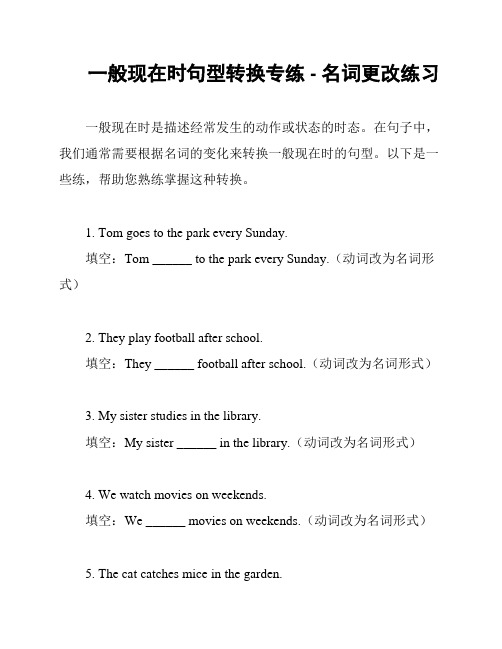
一般现在时句型转换专练 - 名词更改练习一般现在时是描述经常发生的动作或状态的时态。
在句子中,我们通常需要根据名词的变化来转换一般现在时的句型。
以下是一些练,帮助您熟练掌握这种转换。
1. Tom goes to the park every Sunday.填空:Tom ______ to the park every Sunday.(动词改为名词形式)2. They play football after school.填空:They ______ football after school.(动词改为名词形式)3. My sister studies in the library.填空:My sister ______ in the library.(动词改为名词形式)4. We watch movies on weekends.填空:We ______ movies on weekends.(动词改为名词形式)5. The cat catches mice in the garden.填空:The cat ______ mice in the garden.(动词改为名词形式)6. John and Mary go shopping on Saturdays.填空:John and Mary ______ shopping on Saturdays.(动词改为名词形式)7. The students study English in the classroom.填空:The students ______ English in the classroom.(动词改为名词形式)8. She eats breakfast at home.填空:She ______ breakfast at home.(动词改为名词形式)9. He teaches math in the school.填空:He ______ math in the school.(动词改为名词形式)10. I play the piano in the evening.填空:I ______ the piano in the evening.(动词改为名词形式)请根据上述句子的要求,填写相应的名词形式并核对答案。
一般现在时句型转换专项练习
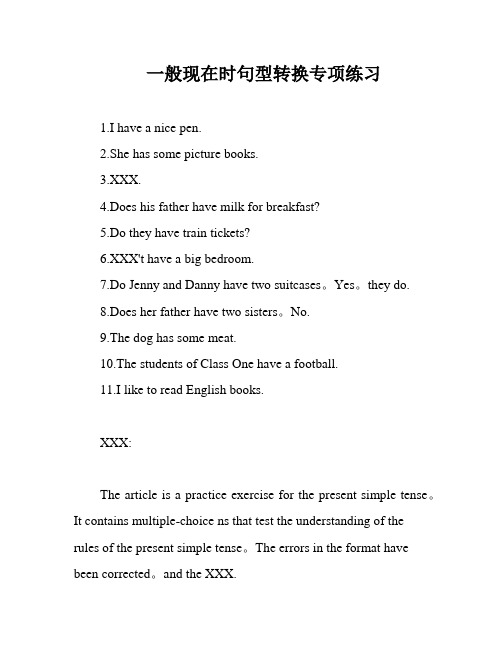
一般现在时句型转换专项练习1.I have a nice pen.2.She has some picture books.3.XXX.4.Does his father have milk for breakfast?5.Do they have train tickets?6.XXX't have a big bedroom.7.Do Jenny and Danny have two suitcases。
Yes。
they do.8.Does her father have two sisters。
No.9.The dog has some meat.10.The students of Class One have a football.11.I like to read English books.XXX:The article is a practice exercise for the present simple tense。
It contains multiple-choice ns that test the understanding of the rules of the present simple tense。
The errors in the format have been corrected。
and the XXX.1.They go to school on foot。
改写:XXX't go to school on foot。
2.He likes to play with his balls。
改写:XXX't like to play with his balls。
3.His XXX't go to work by bus。
改写:His XXX to work by bus。
4.Mrs。
Li and Kitty don't work in a big shop。
- 1、下载文档前请自行甄别文档内容的完整性,平台不提供额外的编辑、内容补充、找答案等附加服务。
- 2、"仅部分预览"的文档,不可在线预览部分如存在完整性等问题,可反馈申请退款(可完整预览的文档不适用该条件!)。
- 3、如文档侵犯您的权益,请联系客服反馈,我们会尽快为您处理(人工客服工作时间:9:00-18:30)。
一般现在时专项练习
一、选择
( ) 1. I _________a nice pen.
A. have
B. has
C. doesn’t has
( ) 2. She ________ some picture books.
A. have
B. has
C. are
( ) 3. Li Ming’s mother _________ any eggs.
A. have
B. don’t have
C. doesn’t have
( ) 4. ________his father _______ milk for breakfast?
A. Does…have
B. Do…has
C. Does…has
( ) 5. _________they_______ train tickets?
A. Does…have
B. Do…have
C. Does…has
( ) 6. Mary _______a big bedroom.
A. have
B. don’t have
C. doesn’t have
( ) 7. ________Jenny and Danny have two suitcases? Yes, they ________.
A. Does…do
B. Do…do
C. Do…does
( ) 8. ________ her father________ two sisters? No.
A. Do…has
B. Does…has
C. Does…have
( ) 9. The dog _______ some meat.
A. has
B. don’t have
C. doesn’t has
( ) 10. The students of Class One ________a football.
A. have
B. don’t has
C. doesn’t have
( ) 11. I ________to read English books.
A. likes
B. don’t likes
C. like
( ) 12. They _______ to school on foot.
A. go
B. goes
C. gos
( ) 13. He _______to play with his balls.
A. likes
B. doesn’t likes
C. like
( ) 14. His father _________to work by bus.
A. don’t go
B. doesn’t goes
C. doesn’t go
( ) 15. Mrs. Li and Kitty _______in a big shop.
A. don’t works
B. don’t work
C. doesn’t work
( ) 16. —_____ you ride a bike to school?
—Yes, I ________.
A. Do…does
B. Does…does
C. Do…do
( ) 17. --______ your sister like PE?
--No, she ______ not.
A. Do…do
B. Does…does
C. Do…does
( ) 18. ________he _______to school every day? No.
A. Does…go
B. Do…go
C. Does…goes
( ) 19. We _________our homework after school.
A. does
B. do
C. dos
( ) 20. He ______ not speak English. He speaks Chinese.
A. do
B. does
C. dos
( ) 21. ______ they watch TV on Sundays? Yes, they ______.
A. Do…do
B. Does…does
C. Do…does
二、把下列肯定句变为否定句。
1. I have two pencils. ___________________________________________________.
2. Bob has short, brown hair. ___________________________________________________
3. We play basketball in the park. ___________________________________________________
4. My uncle works in a store. ___________________________________________________
5. She wears a pair of glasses. ___________________________________________________
6. I like to play football. ___________________________________________________
7. My mother goes to work by bus. ___________________________________________________
8. They go for a walk in the evening. ___________________________________________________
9. Jenny and Danny live in Canada. ___________________________________________________
10. Mary and I like to have fun together. ___________________________________________________
二、把下列肯定句变为一般疑问句并作出肯定回答。
1. My father has a black car.
___________________________________________?______________________.
2. Beijing has shops and hotels.
___________________________________________?______________________.
3. Pandas live in China.
___________________________________________?______________________.
4. We do our homework together.
___________________________________________?______________________.
5. Australia has beautiful beaches.
___________________________________________?______________________.
三、把下列肯定句变为一般疑问句并作出否定回答。
1. He wants a new sweater.
___________________________________________?______________________.
2. I watch TV every day.
___________________________________________?______________________.
3. The boy has blue eyes.
___________________________________________?______________________.
4. We go on a trip to Beijing.
___________________________________________?______________________.
5. He has a pair of red shoes.
___________________________________________?______________________.。
